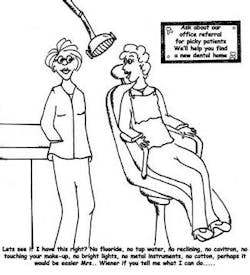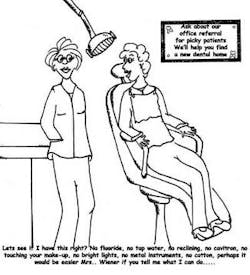Insuring your future
The mere thought of ensuring your future can conjure up all kinds of thoughts that are hardly appealing. Whether you are caught up in the dog days of summer in the southernmost states, or cherishing every minute of being outside in a more northern latitude without multiple layers of clothing, most folks are content to rock along with the status quo.
Even if you throw away the calendar and ignore the clock, the future of your career is still in your hands. Ultimately, you are the one responsible for the actions you do or do not take that affect your future, both personally and professionally.
Most things in life are not linear. In other words, there are usually shades of gray in solving a problem or multiple ways to achieve a goal. Lives are complex, and one’s success and happiness in a dental hygiene career are based on an intricate mix of physical, emotional, and mental actions.
On a professional level, dentistry has been a part of my life since 1968. I’ve learned a lot and made a number of mistakes as well as good career choices. Overall, dental hygiene has been good to me, but I believe this has come about largely because I have taken my career seriously and been willing to actively protect it.
If you are comfortable turning over your career, and ultimately your future, to someone else, then this column will really get under your skin. But if you’re searching for ways to make the most of your chosen profession, the suggestions presented here will help you achieve your goals.
Yesterday I was reviewing a continuing-education course given by Noel Kelsch, RDH (she is the RDH cartoonist). Noel’s presentation put forth a vital message in the most succinct way: “Take care of your body. It is the most important instrument that you have.” Noel is passionate about her message. In the last couple of years, she ignored her body’s warning signs three times and ended up battling life-threatening conditions.
These episodes changed Noel’s thoughts about her career and her future. She began to consider the very real risk of injury due to developing a workplace-related musculoskeletal disorder. In a relatively short period of time, Noel has invested in magnification loupes, an auxiliary headlight, and an ergonomic chair. The benefits to her body were immediate. What steps have you personally taken to create an ergonomically safe working environment or ensure your physical health?
A critical second step in ensuring your career is acquiring a personal disability policy to cover the loss of wages due to illness or injury. Unless you have a Bill Gates type of income, this often-ignored step is critical. No one ever wants to think that an accident will happen, but accidents happen all the time. Unfortunately, I frequently hear from dental professionals who are sidelined by the more obvious issues such as hand, arm, shoulder, or neck and back injuries. Then there are falls at work, unexpected illnesses, and freak accidents.
Some are fortunate enough to make it back into the workforce, but others will never be able to return. There are common threads to their stories. They never thought anything would happen to them. They all thought they could not afford disability and now regret their shortsightedness. If worker’s compensation is involved, they are frustrated with the complexity and insufficient coverage. They mourn the loss of their careers, even temporarily, and are scared out of their wits about their financial future. Are your financial affairs in order, or do you need to review and revise your goals?
Twenty years ago my master’s thesis research proved several important things that are key to ensuring a happy professional career. My study looked in to factors that could be considered key predictors for job and career satisfaction in the dental hygiene profession. The news was not startling. Membership in our professional organization and regular continuing-education activity were the most powerful indicators.
Continuing education can be mentally stimulating. Lifelong learning becomes a lifestyle and helps us keep our clinical proficiencies at a high level. None of us can be experts in all facets of clinical practice. We need to learn from each other and share our clinical successes and failures. Unless you graduated five minutes ago, whatever you learned in school is probably out-of-date. School gives us the basics. We have a professional responsibility to continue to build on this academic framework. What have you learned recently that will help you become a better clinician?
Many hygienists are isolated from others in the profession. If you’re the only hygienist in a practice, there are significant challenges in staying con-
nected with other professionals. Quite honestly, we need each other. Being a member of ADHA is about much more than politics; it is about making a professional commitment. The networking, the support, and the camaraderie among members is amazing.
On a very practical level, ADHA is the only collective professional voice focused on the future of the profession. We cannot fight the battles nor make the advances individually. It is important to come together, pool our thoughts, and develop strategies that will ensure the future of our profession. The dues are minimal, especially when one considers where dental hygiene would be without colleagues who are willing to devote countless hours to protecting and advancing our profession. Are you taking responsibility for the profession as a whole?
Trying something new is a great way to protect your future. There are loads of new products. Techniques change and improve. You could even try a different way to describe a procedure to a patient. Changing things around a bit can keep your clinical day fresh.
The emerging research in caries prevention, early detection, and remineralization protocols is a perfect example of new information that can change how we assess and treat patients. For example, we now have great tools like the DIAGNOdent to help determine the relative strength of tooth structure, or GC’s chairside Saliva Check system that provides valuable patient information about saliva pH, salivary flow rate, and composition.
In addition to new diagnostic methods, there has been an explosion in products that strengthen tooth structure. For years, polishing pastes removed stain and added questionable amounts of fluoride to tooth structure. Now, many of today’s pastes are formulated not only to remove stain, but also to rebuild tooth structure or provide relief from dentinal hypersensitivity. While the actual mechanisms are different, stronger, less sensitive tooth structure is the end result of proper use of new products.
These products and protocols are only part of the story. Xylitol is being used with greater frequency to inhibit caries-producing bacteria. Fluoride varnishes are now widely accepted and newer, easier-to-apply products are being developed. Special calcium and phosphate formulas are being added to products ranging from toothpaste to polishing pastes to mints. Several new sealant materials are moisture-friendly and release significant amounts of fluoride over time.
One could spend hours learning about new products and figuring out how to actively incorporate these new thoughts into daily practice. Every time you acquire new knowledge and information, you become more valuable to your patients and your dental practice. Trying out new ideas prevents mental stagnation and boredom. What new products or protocols have you incorporated in the last year?
Today’s world is full of information. If one really wants to get connected, there are wonderful ways to keep up with new ideas, stamp out isolation, and improve overall career satisfaction. The Internet is a resource that is bringing members of our profession together in ways that were unheard of a decade ago. A number of e-mail groups focus on the dental hygiene community. ADHA has a list serve and two print publications have online communities. The largest and most active community is www.amysrdhlist.com. There are also lists that focus on specific conditions such as [email protected], moderated by Lynne Slim, RDH, MS, or sites where people can discuss problems like xerostomia, autoimmune disorders, and hundreds of other health-related topics. How are you staying connected with other dental hygienists and other health-care professionals?
In addition to these interactive lists, one can find a wide range of information about products, disorders, diseases, and new technology. Pub Med is a rich resource where one can review abstracts and on occasion complete scientific papers. Some journals have online access to supplement traditional print media, while others are totally Web-based. One can even find continuing-education courses, free or for a fee via the Internet. Just type in a few key words in your favorite search engine and you’ll be off on a whole new information experience. Hygienists who have ready access to the Internet in their clinical offices use this valuable tool to look up everything from drug interactions to the latest research on the effects of a particular disease on oral health. Are you using technology to enlarge your world?
These seven strategies work wonders to help ensure a successful and rewarding career. But there is one additional question: What have you done for yourself lately that improves your personal emotional, physical, or mental well-being? This question is not about your career; it is about taking care of yourself as a person. It is as important as regular brushing and flossing. It is about ensuring your own unique personal comfort zone.
We are nurturers by nature and tend to put ourselves on the bottom of the list. Give yourself permission to do at least one thing for yourself within the next couple of days or even week. Notice how good it feels to nurture your own body or soul. A little personal pampering or doing something that you love will balance out the demands of your professional life.

